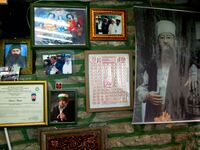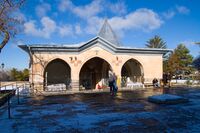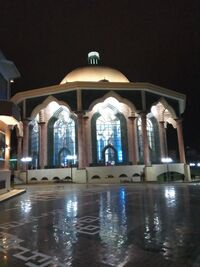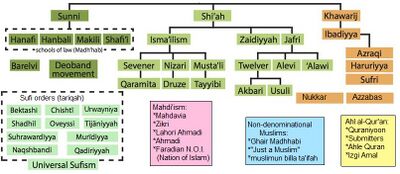بكداشية
 علم البكتاشية | |
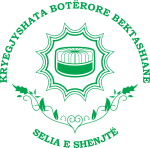 شعار البكتاشية | |
| الاختصار | البكتاشية |
|---|---|
| النوع | Dervish order |
| المقر الرئيسي | المقرات العالمية للبكتاشية، تيرانا (مجمع حاج بكتاش ولي، نڤشهر سابقاً) |
المنطقة | ألبانيا، بلغاريا، اليونان، كوسوڤو، مقدونيا الشمالية، تركيا، جاليات ألبانية أخرى في الخارج (Italy، الولايات المتحدة) والشتات التركي (ألمانيا، فرنسا، النمسا، بلجيكا) |
| بابا موندي | |
الأشخاص البارزون | |
| الموقع الإلكتروني | الموقع الرسمي |
| أخفجزء من سلسلة عن on الطريقة البكتاشية |
|---|
 |
| أخفالصوفية |
|---|
 |
|
|
البكداشية أو البكتاشية (بالتركية: Bektaşi، بالإنگليزية: Bektashi)، هي فرقة دينية سرية ذات علاقة بعلوية تركيا ، تعتبر عادة طريقة صوفية شيعية. تأسست في القرن الثالث عشر عن طريق ولي مسلم يدعى حاج بكتاش ولي تأثرت هذه الطريقة لاحقا في القرن الخامس عشر بالقلندرية. الارتباط بعلي بن أبي طالب صفة أساسية للبكداشية مثل الشيعة الإمامية وعلويو تركيا. البكداشية شديدة الارتباط بعلويي تركيا لحد انهما يمكن اعتبارهما فئة واحدة تشكل ثقافة واحدة يطلق عليها الثقافة والأفكار العلوية-البكداشية. في ألبانيا تطورت البكداشية إلى طائفة إسلامية مستقلة أكثر منها طريقة صوفية تقليدية.
التاريخ
الأصول والتأسيس
الددبابات
جدل تكية أربات بابا
الدولة السيادية المقترحة
 مقالة مفصلة: الدولة السيادية للطريقة البكتاشية
مقالة مفصلة: الدولة السيادية للطريقة البكتاشية
الدولة السيادية للطريقة البكتاشية، هي دولة مدينة ودولة ضئيلة أوروپية مقترحة، ستكون مطوقة بالكامل داخل العاصمة الألبانية تيرانا، في المقر العالمي الحالي للطريقة البكتاشية. إذا تأسست، فسوف تكون أصغر من مدينة الڤاتيكان وتصبح الدولة السيادية ذات أصغر مساحة برية في العالم، بإجمالي مساحة برية تبلغ 27 فداناً.[6]
ناقش رئيس الوزراء الألباني إيدي راما خطط تأسيس الدولة، ودعمها زعيم الطريقة البكتاشية، بابا موندي، حيث صرح الأول أنه سيتم الكشف عن المزيد من التفاصيل المتعلقة بإنشاء الدولة في المستقبل القريب.[7] وبناء على نموذج الڤاتيكان، ستمنح الدولة المحتملة الجنسية فقط لرجال الدين البكتاشيين والمسؤولين الحكوميين.[8] بدأت عملية صياغة التشريع لتأسيس الدولة الجديدة داخل ألبانيا في سبتمبر 2024. وسيحتاج التشريع إلى موافقة البرلمان الألباني[6] من خلال تعديل دستور ألبانيا.[9]
الاعتقادات
الشعر والأدب
التسلسل الهرمي المجتمعي
الإدارة
المؤتمر البكتاشي العالمي
| الترتيب | المؤتمر | التاريخ | الموقع | الهوامش |
|---|---|---|---|---|
| 1 | المؤتمر الوطني البكتاشي الأول | 14–17 يناير 1921 | tekke of Prishta in the Skrapar region | The name Komuniteti Bektashian (Bektashi community) was adopted. |
| 2 | المؤتمر الوطني البكتاشي الثاني | 8–9 يوليو 1924 | Gjirokastra | |
| 3 | المؤتمر الوطني البكتاشي الثالث | 23 سبتمبر 1929 | tekke of Turan near Korça | The Bektashi declared themselves to be a religious community autonomous from other Islamic communities. |
| 4 | المؤتمر الوطني البكتاشي الرابع | 5 مايو 1945 | تيرانا | Xhafer Sadiku Dede was made kryegjysh (or dedebaba), and the influential Baba Faja Martaneshi, a communist collaborator, was made secretary general. |
| 5 | المؤتمر الوطني البكتاشي الخامس | 16 أبريل 1950 | تيرانا | |
| 6 | المؤتمر الوطني البكتاشي السادس | 19–20 يوليو 1993 | تيرانا | |
| 7 | المؤتمر الوطني البكتاشي السابع | 23–24 سبتمبر 2000 | تيرانا | |
| 8 | المؤتمر الوطني البكتاشي الثامن | 21 سبتمبر 2005 | تيرانا | |
| 9 | المؤتمر الوطني البكتاشي التاسع | 6 يوليو 2009 | تيرانا |
قائمة الددبابات
في تركيا (قبل 1930)
- حاج بكتاش ولي (1282-1341)
- Hidër Llalla (1341-1361)
- Resul Balli (1361-1441)
- Jusuf Balli (1400s)
- Myrsel Balli (1400s)
- Balım Sultan (1509-1516)
- Sersem Ali Dede Baba (1551–1569)
- Eihaxh Ahmed Dede Baba (1569–1569)
- Ak Abdulla Dede Baba (1569–1596)
- Kara Halil Dede Baba (1596–1628)
- Eihaxh Vahdeti Dede (1628–1649)
- Eihaxh Sejjid Mustafa Dede Baba (1649–1675)
- Ibrahim Agjah Dede Baba (1675–1689)
- Halil Ibrahim Dede Baba (1689–1714)
- Haxhi Hasan Dede Baba (1714–1736)
- Hanzade Mehmed Kylhan Dede (1736–1759)
- Sejjid Kara Ali Dede Baba (1759–1783)
- Sejjid Dede Baba (1783–1790)
- Haxhi Mehmed Nuri Dede Baba (1790–1799)
- Haxhi Halil Haki Dede Baba (1799–1813)
- Mehmed Nebi Dede Baba (1813–1834)
- Haxhi Ibrahim Dede Baba (1834–1835)
- Sejjid Haxhi Mahmud Dede Baba (1835–1846)
- Saatxhi Dede Baba (1846–1848)
- Sejjid Hasan Dede Baba (1848–1849)
- Elhaxh Ali Turabi Dede Baba (1849–1868)
- Haxhi Hasan Dede Baba (1868–1874)
- Perishan Hafizali Dede Baba (1874–1879)
- Mehmed Ali Hilmi Dede Baba (1879–1907)
- Haxhi Mehmed Ali Dede Baba (1907–1910)
- Haxhi Fejzullah Dede Baba (1910–1913)
- Sali Njazi Dede Baba (1913–1925)
في ألبانيا (1930–الحاضر)
| الترتيب | صورة | الاسم | في المنصب | |
|---|---|---|---|---|
| 1 | 
|
صالح نيازي (1876–1941) |
20 مارس 1930[10] | 28 نوفمبر 1941 |
| 11 years, 8 months and 8 days | ||||
| 2 | 
|
علي رضا (1882–1944) |
6 يناير 1942 | 22 فبراير 1944 |
| 2 years, 1 months and 16 days | ||||
| 3 | 
|
كمبر علي (1869–1950) |
12 أبريل 1944 | 1945 |
| 0 or 1 years | ||||
| 4 | 
|
ظافر صادق (1874–1945) |
5 مايو 1945 | 2 أغسطس 1945 |
| 2 months and 28 days | ||||
| 5 | 
|
أباظ علمي (1887–1947) |
6 سبتمبر 1945 | 19 مارس 1947 |
| 1 years, 6 months and 13 days | ||||
| 6 | 
|
أحمد ميفتار (1916–1980) |
8 يونيو 1947 | 1958 |
| 9 or 10 years | ||||
| 7 | 
|
بابا رشاد (1935–2011) |
20 يوليو 1993 | 2 أبريل 2011 |
| 17 years, 8 months and 13 days | ||||
| 8 | 
|
بابا موندي (1959) |
11 يونيو 2011 | الحالي |
| 13 years, 9 months and 10 days | ||||
شخصيات دينية
- أباظ حلمي, Dede Baba, of the Tekke of Frashër (1887–1947)
- عباس بن علي
- Abdullah Baba of Melçan (1786–1857 (−1853?))
- Abedin Baba of Leskovik
- Adem Baba of Prizren (d. 1894)
- Adem Vexh-hi Baba of Gjakova (1841–1927)
- Ahmet Baba of Prishta (d. 1902)
- Ahmet Baba of Turan (1854–1928)
- Ahmet Karadja
- Ahmet Myftari, Dede Baba (1916–1980)
- Ahmet Sirri Baba of Mokattam (1895–1963)
- Ali Baba of Berat
- Ali Baba of Tomorr (1900–1948)
- Ali Baba Horasani of Fushë Kruja (d. 1562)
- Ali Haqi Baba of Gjirokastra (1827–1907)
- Ali Riza of Elbasan, Dede Baba (1876–1944)
- Alush Baba of Frashër (c. 1816–1896)
- Arshi Baba of Durballi Sultan (1906–2015)
- Arshi Baba of Gjirokastra (d. 1621)
- Asim Baba of Gjirokastra (d. 1796)
- Balim Sultan of Dimetoka (1457–1517)
- Dylgjer Hysejni of Elbasan (b. 1959)
- Edmond Brahimaj, Dede Baba (1910–1947)
- Faja Martaneshi Baba
- Fetah Baba of Backa
- Hajdar Hatemi Baba of Gjonëm (early 19th century)
- Hajdër Baba of Kardhiq (d. 1904)
- Haji Bektash Veli (1248–1337) (Albanian: Haxhi Bektashi Veli; Turkish: Hacı Bektaş Veli)
- Hasan Dede of Përmet
- Haxhi Baba Horasani of Përmet (d. 1620)
- Haxhi Baba of Fushë Kruja
- Hidër Baba of Makedonski Brod
- Hysen Baba of Melçan (d. 1914)
- Hysen Kukeli Baba of Fushë Kruja (1822–1893)
- Ibrahim Baba of Qesaraka (d. 1930)
- Ibrahim Xhefai Baba of Elbasan (d. 1829)
- Iljaz Vërzhezha, Dervish (d. 1923)
- Kamber Ali, Dede Baba (1869–1950)
- Kasem Baba of Kastoria (late 15th century)
- Kusum Baba of Vlora
- Lutfi Baba of Mokattam (1849–1942)
- Mehmet Baba of Fushë Kruja (1882–1934)
- Meleq Shëmbërdhenji Baba (1842–1918)
- Muharrem Baba of Frashër (early 19th century)
- Muharrem Mahzuni Baba of Durballi Sultan (d. 1867)
- Myrteza Baba of Fushë Kruja (1912–1947)
- Qazim Baba of Elbasan (1891–1962)
- Qazim Baba of Gjakova (1895–1981)
- Qamil Baba of Gllava (d. 1946)
- Reshat Bardhi, Dede Baba (1935–2011)
- Rexheb Baba of Gjirokastra (1901–1995)
- Salih Baba of Matohasanaj (19th to 20th centuries)
- Salih Nijazi, Dede Baba (1876–1941)
- Sari Saltik
- Seit Baba of Durballi Sultan (d. 1973)
- Selim Kaliçani Baba of Martanesh (1922–2001)
- Selim Ruhi Baba of Gjirokastra (1869–1944)
- Selman Xhemali Baba of Elbasan (d. 1949)
- Sersem Ali Baba of Tetova (d. 1569)
- Shemimi Baba of Fushë Kruja (1748–1803)
- Sulejman Baba of Gjirokastra (d. 1934)
- Tahir Nasibi Baba of Frashër (d. 1835)
- Tahir Baba of Prishta (19th century)
- Xhafer Sadiku, Dede Baba (1874–1945)
التأثيرات العقائدية في الأناضول والبلقان
| أظهرThe historical emergence of the Shī‘ah Imāmī Alevī-Bektaşi Ṭarīqah |
|---|
معرض الصور
Bektashi tekke of Gjakova, Kosovo, established in 1790
World Headquarters of the Bektashi Community in Tirana, Albania
الهوامش
المصادر
- ^ "Encyclopedia Iranica, "BEKTĀŠĪYA"". Archived from the original on 10 September 2015. Retrieved 24 June 2014.
- ^ "Encyclopedia Iranica, "ḤĀJĪ BEKTĀŠ"". Archived from the original on 17 May 2018. Retrieved 15 May 2018.
- ^ أ ب "ʿALĪ AL-AʿLĀ (d. 822/1419), also known as Amīr Sayyed ʿAlī, principal successor of Fażlallāh Astarābādī, founder of the Ḥorūfī sect". Archived from the original on 17 May 2018. Retrieved 15 May 2018.
- ^ "Encyclopedia Iranica, "ASTARĀBĀDĪ, FAŻLALLĀH" (d. 796/1394), founder of the Ḥorūfī religion, H. Algar". Archived from the original on 17 May 2019. Retrieved 15 May 2018.
- ^ "Encyclopedia Iranica, "HORUFISM" by H. Algar". Archived from the original on 17 May 2018. Retrieved 15 May 2018.
- ^ أ ب Higgens, Andrew (21 September 2024). "Albania Is Planning a New Muslim State Inside Its Capital". The New York Times. Archived from the original on 21 September 2024. Retrieved 21 September 2024.
- ^ "'A Vatican inside Tirana'/ Rama, for 'New York Times': It will be called the Sovereign State of the Bektashi Order". CNA. 21 September 2024. Retrieved 21 September 2024.
- ^ "Exclusive Interview with the Head Father of the Bektashi Order: A New Sovereign State for Peace and Tolerance (English version)". Shqiptarja.com (in الإنجليزية). Archived from the original on 21 September 2024. Retrieved 22 September 2024.
- ^ "Albania to set up Sufi Muslim Bektashi microstate". Deutsche Welle. 2024-09-26. Archived from the original on 26 September 2024. Retrieved 2024-09-24.
- ^ Çuni, Nuri (28 January 2020). "Kryegjyshata Botrore Bektashiane/ Sot, 90-vjetori i ardhjes në Shqipëri të Kryegjyshit Botror të Bektashinjve, Sali Niazi Dedei. Kryegjyshi Botror, Haxhi Dede Edmond Brahimaj: Sot në Korçë zhvillohet aktiviteti për "Nderin e Kombit". Ja historia e plot e klerikut atdhetar". Gazeta Telegraf (in الألبانية).
- ^ خطأ استشهاد: وسم
<ref>غير صحيح؛ لا نص تم توفيره للمراجع المسماةElsie 2019 - ^ Balcıoğlu, Tahir Harimî, Türk Tarihinde Mezhep Cereyanları – The course of madhhab events in Turkish history, (Preface and notes by Hilmi Ziya Ülken), Ahmet Sait Press, 271 pages, Kanaat Publications, Istanbul, 1940. (in تركية)
- ^ أ ب Ocak, Ahmet Yaşar XII yüzyılda Anadolu'da Babâîler İsyânı – Babai Revolt in Anatolia in the Twelfth Century, pages 83–89, Istanbul, 1980. (in تركية)
- ^ "Encyclopaedia of Islam of the Foundation of the Presidency of Religious Affairs," Volume 4, pages 373–374, Istanbul, 1991.
- ^ Balcıoğlu, Tahir Harimî, Türk Tarihinde Mezhep Cereyanları – The course of madhhab events in Turkish history – Two crucial front in Anatolian Shiism: The fundamental Islamic theology of the Hurufiyya madhhab, (Preface and notes by Hilmi Ziya Ülken), Ahmet Sait Press, page 198, Kanaat Publications, Istanbul, 1940. (in تركية)
- ^ According to Turkish scholar, researcher, author and tariqa expert Abdülbaki Gölpınarlı, "Qizilbashs" ("Red-Heads") of the 16th century – a religious and political movement in Azerbaijan that helped to establish the Safavid dynasty – were nothing but "spiritual descendants of the Khurramites". Source: Roger M. Savory (ref. Abdülbaki Gölpinarli), Encyclopaedia of Islam, "Kizil-Bash", Online Edition 2005.
- ^ According to the famous Alevism expert Ahmet Yaşar Ocak, "Bektashiyyah" was nothing but the reemergence of Shamanism in Turkish societies under the polishment of Islam. (Source: Ocak, Ahmet Yaşar XII yüzyılda Anadolu'da Babâîler İsyânı – Babai Revolt in Anatolia in the Twelfth Century, pages 83–89, Istanbul, 1980. (in تركية))
المراجع
- Algar, Hamid (1989). "BEKTĀŠĪYA". Encyclopaedia Iranica. Vol. IV. pp. 118–122.
- Doja, Albert. 2006. "A political history of Bektashism from Ottoman Anatolia to Contemporary Turkey." Journal of Church and State 48 (2): 421–450. doi=10.1093/jcs/48.2.423.
- Doja, Albert. 2006. "A political history of Bektashism in Albania." Politics, Religion & Ideology 7 (1): 83–107. doi=10.1080/14690760500477919.
- Elsie, Robert (2001). A Dictionary of Albanian Religion, Mythology and Folk Culture (in الإنجليزية). New York: New York University Press. ISBN 978-1-85065-570-1.
- Nicolle, David; UK (1995). The Janissaries (5th). Osprey Publishing. ISBN 1-85532-413-X.
- Muhammed Seyfeddin Ibn Zulfikari Derviş Ali; Bektaşi İkrar Ayini, Kalan Publishing, Translated from Ottoman Turkish by Mahir Ünsal Eriş, Ankara, 2007 Turkish
- Saggau, Emil BH. "Marginalised Islam: Christianity's role in the Sufi order of Bektashism." In Exploring the Multitude of Muslims in Europe, pp. 183–197. Brill, 2018.
قراءات إضافية
- Elsie, Robert (2019). The Albanian Bektashi: history and culture of a Dervish order in the Balkans. London: I.B. Tauris. ISBN 978-1-78831-569-2. OCLC 1108619669.
- Yürekli, Zeynep (2012). Architecture and hagiography in the Ottoman Empire : the politics of Bektashi shrines in the classical age. Farnham, Surrey Burlington, VT: Ashgate. ISBN 978-1-4094-1106-2. OCLC 776031990.
- Frashëri, Naim Bey. Fletore e Bektashinjet. Bucharest: Shtypëshkronjët të Shqipëtarëvet, 1896; Reprint: Salonica: Mbrothësia, 1909. 32 pp.
وصلات خارجية
- Official website of the Kryegjyshata Botërore Bektashiane (World Headquarters of the Bektashi)
- Videos and documentaries (in ألبانية)
- History of the Bektashi Order of Dervishes
